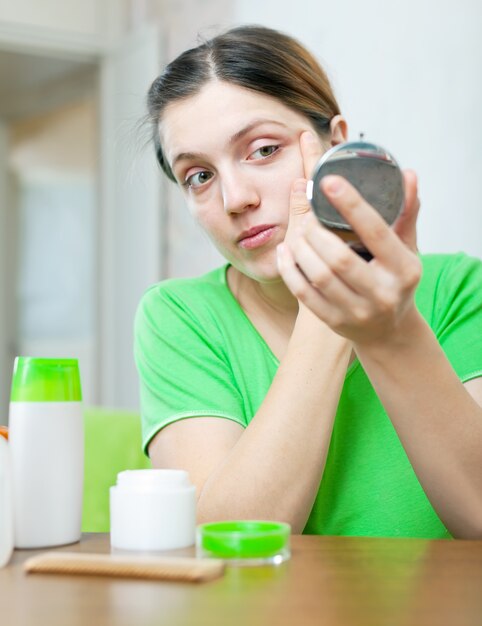
Acne scars form when inflammatory acne damages the skin and hampers collagen production, leaving behind spots or scars. They’re a common issue, but with the right treatment and care, they can be minimized or removed. Being well-informed about acne scars is essential for effective prevention and treatment.
One of the main causes of acne scars is mishandling the affected area, such as popping pimples, picking at them, or attempting to extract blackheads with fingers. These actions often worsen the problem by increasing the risk of scars and dark spots. For some people, acne scars fade over time, but others may find that these marks persist, affecting their confidence and self-esteem.
The good news is that all types of acne scars are treatable. If you frequently experience inflammatory acne, it’s crucial to see a dermatologist, who can assess the type and severity of your scars and recommend the best treatment. While professional medical treatments are highly effective, there are also natural remedies that can help reduce or prevent acne scars in a safe and cost-effective way.
### Important Facts About Acne Scars
**1. Acne Scars Don’t Always Fade on Their Own**
Many believe that acne scars will naturally disappear over time, which is only partially true. While mild acne, like blackheads or whiteheads, may fade as they run their course, severe or inflamed acne is more likely to leave scars. Ignoring these types of acne can lead to long-term marks, so it’s important to consult a specialist if you notice persistent or severe acne.
**2. Popping Pimples Can Worsen Scars**
A common misconception, especially among teenagers, is that popping pimples will help remove blemishes or scars. However, squeezing or picking at acne often pushes dirt and bacteria deeper under the skin, leading to irritation and even more noticeable scars. It’s better to handle affected areas gently and avoid these risky habits.
**3. Acne Isn’t Contagious**
Contrary to popular belief, acne and acne scars are not contagious. They don’t spread through skin contact with an affected person, as acne develops due to individual factors, such as clogged oil glands, and not external transmission.
**4. Acne Scars Can Form on Any Skin Type**
People with all skin types can develop acne scars, not just those with oily or unclean skin. Scrubbing excessively or over-cleansing with the idea of preventing scars can actually harm the skin further. Scars are often caused by internal factors, like overactive oil glands, so a well-rounded skincare approach is more effective than focusing solely on cleanliness.
**5. Treatment Depends on the Type of Scar**
Acne scars can be categorized into different types, and the treatment varies accordingly:
– *Atrophic scars* are shallow with smooth edges, such as ice pick scars, which are deep and have sharp borders.
– *Hypertrophic scars* are raised scars that are more common on the chest and back than on the face.
A dermatologist will determine the best treatment based on the type and severity of the scars.
### Common Treatment Methods for Acne Scars
**Microdermabrasion**
This involves a gentle spray of fine crystals to exfoliate the skin’s surface, helping reduce scars. It’s less invasive than dermabrasion and often requires multiple sessions for full results.
**Dermabrasion**
A more intensive option, dermabrasion uses high-speed brushes to remove deeper layers of scarred skin. Recovery takes a few days, but the results can be quite dramatic.
**Laser Treatments**
Laser therapy is a popular option for treating both flat and raised scars. It removes the outer layer of the skin and lightens any redness around healed acne areas. The number of sessions and recovery time depend on the laser type used.
**Chemical Peels**
In this method, a chemical solution is applied to remove the outer layer of the skin and reduce shallow scars or discoloration. Mild redness and peeling may occur for a few days following the treatment.
**Fillers**
For scars that leave depressions in the skin, fillers such as collagen, fat, or hyaluronic acid can even out the surface. Since the fillers are absorbed over time, this treatment may need to be repeated periodically.
**Retinoic Acid**
Keloid scars or raised tissue scars can be treated with retinoic acid creams. Regular application helps fade scars without the need for invasive treatments.
**Skin Grafting**
In cases where other treatments leave behind large indentations, skin grafting can provide effective results. A small piece of skin, typically taken from behind the ear, is used to fill in the scarred area.
**Punch Excision**
For deep pitted scars, this minor surgical procedure involves cutting out the scar and repairing the area with stitches or skin grafting.
### Natural Home Remedies for Acne Scars
If your scars are mild or recent, natural remedies can be a safe, cost-effective option to reduce their appearance. Here are some popular methods:
– **Coconut Oil**: Known for its deep moisturizing properties, coconut oil can help heal scars. Dab a little oil onto the affected area overnight, but avoid applying it to unaffected skin, as it may clog pores.
– **Honey**: Raw honey, especially when paired with cinnamon powder, can reduce inflammation and promote the growth of healthy skin tissues. Apply it directly to scars for natural healing.
– **Turmeric**: With strong anti-inflammatory and antioxidant properties, turmeric helps reduce pigmentation and smooth the skin’s texture. Mix it with honey, apply for 20 minutes, and rinse with cool water.
– **Aloe Vera**: Aloe vera gel soothes irritated skin, reduces redness, and prevents oil buildup. Apply it daily to scars for best results.
– **Baking Soda**: Baking soda works as a natural exfoliant, removing dead skin cells and promoting healthy skin. Mix it with water to form a paste, gently scrub the affected area, and rinse after one minute.
Acne scars can be frustrating, but whether you opt for medical treatments or try natural remedies, understanding your specific skin condition is key to successful healing. By staying consistent and adopting the right approach, you can achieve healthier, smoother skin over time.